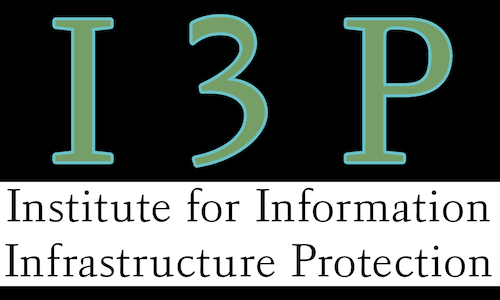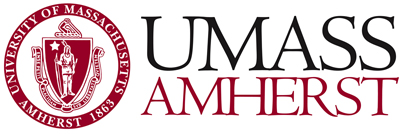on RFID Security and Privacy 2011
Tutorials
RFIDsec 2011 is proud to offer a wide selection of hands-on and lecture-style tutorials. Full-day and half-day options exist. All tutorials will be taking place on Sunday, June 26, 2011 in the Computer Science Building on the campus of the University of Massachusetts Amherst. Lunch and coffee breaks are included. You may register for tutorials by clicking on the "Registration" link to the left.
- T1: Introduction to RFID Security & Privacy (CS Room 140)
- T2: The Physics of RFID (CS Room 140)
- T3: Hands-on Side Channel Attacks Against Smart Cards and
Other Tokens
(sponsored by Cryptography Research) (CS Room 142) - T4: Hands-on Programming of Batteryless, RFID-Scale Computers with Sensors (CS Room 150)
Introduction to RFID Security & Privacy
When: Sunday 9am–12:30pm in CS Room 140
 Instructor:Dr. Ari
Juels, Ph.D.
Instructor:Dr. Ari
Juels, Ph.D.Who should attend: Beginners who would like to learn more about how to mitigate the the security and privacy risks of RFID technology. Interested persons may include (1) engineers and researchers looking for a technical background on academic and industrial aspects of RFID security, and (2) technically savvy managers who seek to understand the risks and benefits of RFID technology. People who need to deploy an RFID system will learn about potential threats and pitfalls in RFID security and privacy.
Description: Producers of Radio Frequency IDentification (RFID) technology descrube a new world of automation and consumer convenience. Indeed, RFID surrounds us in many forms: supply chains, car keys, credit cards, subway fare passes, and even blood bags. Yet these new applications can result in unintentional privacy risks and security pitfalls. In this tutorial, participants will gain an understanding of (1) applications of secure RFID systems in public transportation, electronic payments, and access control; (2) cutting-edge cryptographic attacks on deployed RFID security systems; (3) and defenses to avoid security and privacy risks. Participants will also learn the basic properties of how RFID works from the perspective of someone who uses RFID products. After completing this tutorial, participants will better understand how to quantify and reduce the security and privacy risks of deploying RFID-based systems.
About the speaker:
Dr. Ari Juels is Chief Scientist of RSA, The Security Division of EMC, and Director of RSA Laboratories. He works to bring sparks of invention and insight from RSA's scientists and affiliates to the company at large and advises on the science behind RSA's technology strategy and vision. He joined RSA in 1996. Ari's dozens of research publications span a range of topics, including biometric security, RFID security and privacy, electronic voting, browser security, combinatorial optimization, and denial-of-service protection. Ari has served as the program chair or co-chair for a number of conferences and workshops, and is a frequent invited speaker at industry events. In 2004, MIT's Technology Review Magazine named Dr. Juels one of the world's top 100 technology innovators under the age of 35. Computerworld honored him in its "40 Under 40" list in 2007. Ari received his B.A. in Latin Literature and Mathematics from Amherst College in 1991 and his Ph.D. in Computer Science from U.C. Berkeley in 1996.
The
Physics of RFID
When: Sunday 1:30pm–5pm in CS Room 140

 Instructors:
Prof. Matt Reynolds, Ph.D.,
& Dr. Ravi Pappu, Ph.D.
Instructors:
Prof. Matt Reynolds, Ph.D.,
& Dr. Ravi Pappu, Ph.D.
Who should attend: Engineers looking to understand how RFID
communication works at the physical layer of near-field and far-field communication. This
is an intermediate level tutorial.
Description: Radio Frequency Identification (RFID) systems have been
around for over 50 years, starting with the pioneering radar transponder work of the MIT
Radiation Laboratory. Today, the acronym RFID typically refers to single chip, passive
transponders operating at 125KHz, 13.56MHz, or UHF (915MHz) that are widely used for
access control, electronic toll collection, automotive anti-theft, and other closed
system applications. Recent interest has focused on supply chain management applications
for RFID, where RFID tags are used to augment the bar code to provide a case- and
item-level view into complex supply chains. This revolution is being aggressively driven
by retailers such as Wal-Mart, consumer packaged goods manufacturers like Gillette, and
the Department of Defense, all of which have complex supply chain systems that could be
made more efficient by using RFID. This talk will provide a brief historical overview of
the field, show some examples of the current state of the art in RFID, and then explain
the basic physical principles of operation of a UHF RFID tag, using a working RFID system
to show these concepts. Questions about RFID privacy will also be addressed.
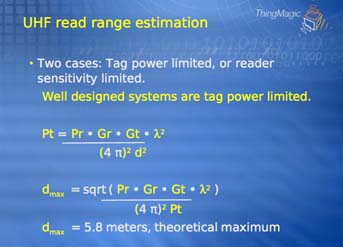 About the
speakers:
About the
speakers:
Matt Reynolds is an Assistant Professor in the Department of
Electrical and Computer Engineering at Duke University. He
is also co-founder of the RFID systems firm ThingMagic, Inc.
(acquired by Trimble Navigation) and energy conservation
firm Zensi (acquired by Belkin). His research interests
include RFID, energy efficiency at the physical layer of
wireless communication, and the physics of sensing and
actuation. He has 7 issued and over 15 patents pending
before the USPTO. He holds a Ph.D. from the MIT Media Lab,
where he was a Motorola Fellow, as well as S.B. and
M.Eng. degrees in Electrical Engineering and Computer
Science from MIT. He is a Senior Member of the IEEE and a
member of the IEEE Microwave Theory and Techniques Society.
Ravi Pappu
is the VP of the Advanced Development Group at ThingMagic, a division of Trimble Navigation. Ravi's group is tasked with developing cutting-edge systems based on ThingMagic's portfolio of RFID products and solving challenging RFID system optimization problems for ThingMagic customers. Among other projects, he led the design and implementation of the Tool Link system in collaboration with Ford Motor Company and DeWalt. He received his Ph.D. from MIT for the invention of physical one-way functions. While at MIT, he co-created the first dynamic holographic video system with haptic interaction. He has published 25 papers and is a named inventor on 12 US and international patents. Ravi is one of Technology Review's TR100 innovators and also received the Carl T. Humphrey Memorial Award for Contributions to the Engineering Profession from Villanova University.
News: NY Times
Hands-on Side Channel Attacks
against Smart Cards and Other Tokens
When: Sunday 9am–5pm in CS Room 142

 Instructors: David Oswald & Timo
Kasper
Instructors: David Oswald & Timo
Kasper
Who should attend: Engineers who must protect secret keys and other
information stored on RFID tags, contactless cards, and smart cards from side channel
analysis. This is an advanced tutorial.
Description: Led by Timo Kasper and David Oswald from Ruhr-Univ.,
Bochum, Germany. Participants will receive a full day of lectures and hands-on exercises
with a microcontroller-based smartcard and USB-based scopes. Participants will learn
about the basics of side-channels attacks, possible countermeasures, and tools for
analysis of devices of interest to the RFID industry. By the end of the tutorial,
participants will be able to perform a Differential Power Analysis to recover the secret
key of a cipher that is highly secure from the mathematical perspective.
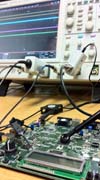 About the speakers:
About the speakers:
David Oswald has a degree in IT-Security and is presently a PhD student
at the Chair for Embedded Security, Ruhr-University Bochum. His main field of research is
the practical security analysis of embedded systems, e.g., commercially employed RFID
smartcards. The focus is on attack methods that exploit weaknesses in the physical
implementation of mathematically secure cryptographic algorithms. Those techniques
include both (passive) side-channel analysis and (active) fault injection.
Timo Kasper
is an assistant researcher at the Embedded Security group
headed by Christof Paar. He has studied electrical engineering and information
technology at the Ruhr-University Bochum (Germany) and the University of
Sheffield (UK), and became a graduate engineer in 2006. His field of research
covers the security of embedded systems such as smartcards, RFID and wireless
technology, including side-channel cryptanalysis and system-level attacks such
as relay attacks. His numerous publications focus on wireless embedded systems
and demonstrate security vulnerabilites of real-world applications by breaking
widespread access control (KeeLoq, Crypto 2008) and payment systems (Financial
Crypto 2010).
This tutorial is generously sponsored by Cryptography Research.
Hands-on Programming of Batteryless, RFID-Scale
Computers with Sensors
Part 1
Part 2
When: Sunday 9am–5pm in CS Room 150
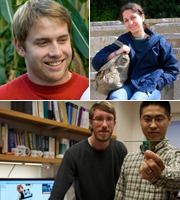 Instructors: Shane
Clark (Lead), Hong Zhang, Ben Ransford,
Mastooreh Salajegheh
Instructors: Shane
Clark (Lead), Hong Zhang, Ben Ransford,
Mastooreh Salajegheh
Who should attend: Engineers who want to use sensors, computation, or
radio communication in places where batteries are difficult to maintain. This is an
intermediate tutorial.
Description: In this full-day tutorial, participants will learn how to
create programs for an emerging class of batteryless devices that behave like RFID tags
but function like von Neumann computing architectures. Participants will receive lectures
and hands-on exercises with the UMass Moo
device, which may be purchased after the tutorial. The syllabus includes getting started
with the Moo, learning about the physical development environment, exercises in writing
effective programs, backscatter radio communication, and special tools such as Mementos and Half-Wits
 About the
speakers:
About the
speakers:
Shane Clark, Hong Zhang, Ben Ransford, and Mastooreh
Salajegheh are research assistants in the Security
and Privacy Research Lab in the Department of Computer
Science at UMass Amherst. Their work aims to make programming
more natural for RFID-scale computers that must remain
low-power and secure.




